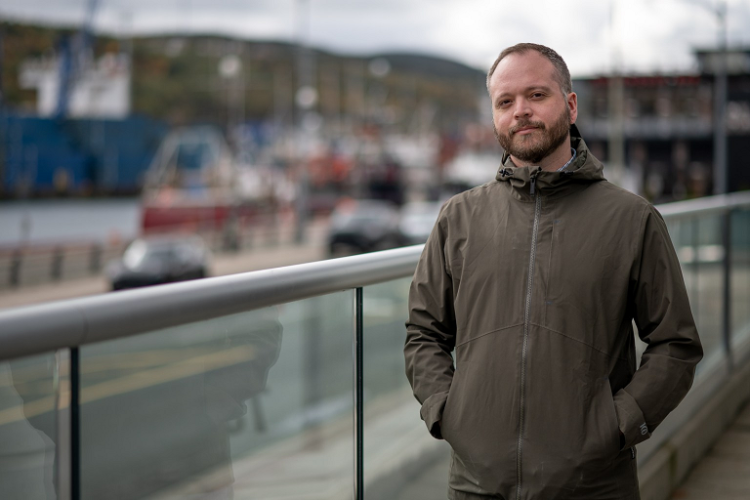As a social worker with Victim Services in downtown St. John's, Ryan Dinn supports survivors of gender-based violence every day.

Master of social work graduate Ryan Dinn in downtown St. John's. Photo: Rich Blenkinsopp
This frontline work directly informed the fall graduate's academic work as a student in the Master of Social Work (MSW) Program at Memorial University.
As part of his graduate studies, the Mount Pearl native led Listen to Someone's Story, an interpretative phenomenological study.
It explores the experiences of disabled women and gender-diverse people on Newfoundland's Avalon Peninsula who are survivors of gender-based violence.
The goal of the study is to identify and help close systemic gaps in service provision for disabled women and gender-diverse people, amplifying their voices as part of a larger provincewide research project with the Collaborative Anti-ableism Research and Education in Social Work Lab (CARES Lab).
"What makes Ryan stand out is the clear relationship between his practice and research," said his mentor, Dr. Ami Goulden, an assistant professor in the School of Social Work at Memorial and the director of the CARES Lab. "His combination of academic excellence, frontline commitment and dedication to social justice makes him a model for how social workers can bridge research and practice."
Practice informed by experience
After completing a bachelor of social work degree at Memorial and working as a registered social worker in several different capacities, Mr. Dinn says he felt it was important to focus his learning in a more specific area of social work practice.
Memorial's Master of Social Work Program provided an opportunity to do just that.
Fieldwork is an integral component of the social work programs at both the undergraduate and graduate levels.
"My day-to-day work reinforces my ability to approach research from a perspective that's informed by my experiences working with vulnerable individuals." Ryan Dinn
Mr. Dinn completed his master's field practicum with Victim Services, where he currently works as a regional co-ordinator.
"My academic work strengthens my ability to do the work I do in that role," he said. "Likewise, my day-to-day work reinforces my ability to approach research from a perspective that's informed by my experiences working with vulnerable individuals."
Living and working in a gendered world
Social work is often described as a women-majority profession, and many of the qualities valued in the field, such as empathy, compassion and understanding, have historically been associated with women's roles.
However, Mr. Dinn emphasizes that those are human qualities that everyone should strive to embody, while remaining mindful of how gender continues to shape experiences in practice.
"I am a cisgender man and I have to be aware of my social location and how this can sometimes mean I'm not the right service provider for individuals to feel safe to disclose very difficult experiences," he said. "Being a part of a team of people occupying a variety of social locations, both at work and in the research project my master's program was part of, involves maintaining a conscious awareness of where I hold privilege and where my voice is not the one that should be prioritized."
With his master's degree in hand, Mr. Dinn says he hopes to continue bridging research and practice in the pursuit of social change.
He plans to pursue a PhD in social work at Memorial, focusing on gender-based violence, while continuing to serve the community in his work with Victim Services.













